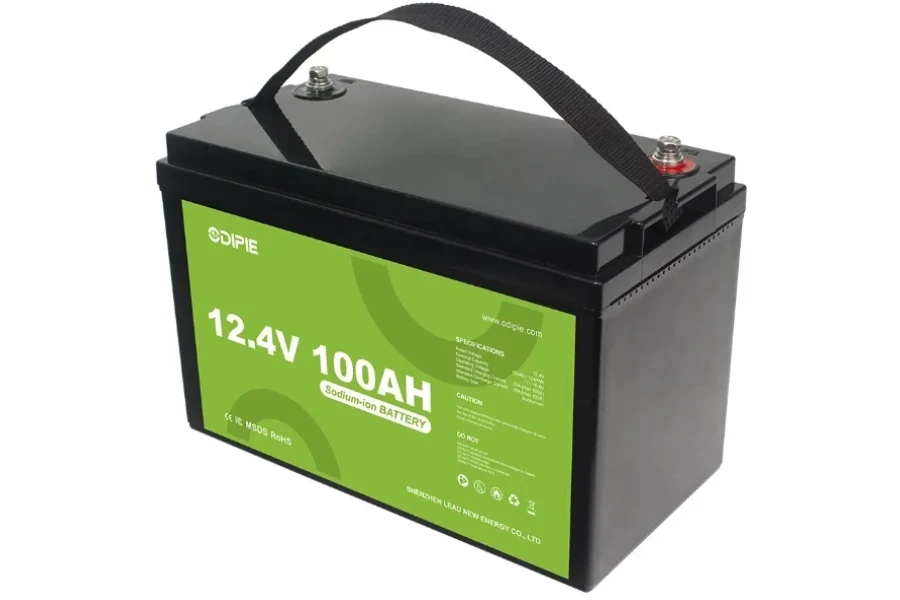Saltwater batteries are a cost-effective, safe, and environmentally friendly energy storage solution. This article will provide a brief overview of saltwater batteries and highlight the key factors you should consider when selecting them in 2024.
Table of Contents
What are saltwater batteries
Classifications
Application scenarios
Saltwater vs. lithium batteries
Factors to consider when choosing a saltwater battery
Technology trends
The bottom line
What are saltwater batteries
Saltwater batteries, as a green and sustainable energy solution, have attracted much attention in the commercial sector in recent years. The significant advantage of brine batteries over conventional batteries is their use of environmentally friendly and cost-effective raw materials, salt, and water, rather than relying on rare or toxic heavy metals and chemicals.
The principle of this type of battery is based on a chemical reaction in an electrolyte (saline solution), where an electric current is generated by using different metallic materials (e.g., copper and zinc) as electrodes. The environmentally friendly nature of brine batteries and the wide availability of raw materials make them an attractive energy option, especially for communities and developing regions seeking sustainable energy solutions.
However, saltwater batteries still fall short of conventional batteries (e.g., lithium-ion batteries and lead-acid batteries) in terms of energy density and efficiency, which limits their application in high-energy demand scenarios. Nonetheless, the commercial value of saltwater batteries cannot be overlooked, especially in specific applications such as emergency power, environmental monitoring devices, and educational tools.
Due to their simple manufacturing process and low cost, saltwater batteries offer a cost-effective way to provide energy, especially in areas with limited resources or far from the grid. In addition, with the development of new materials and technologies, the performance of brine batteries is gradually improving, and their commercial potential is subsequently increasing.
For example, by optimizing electrode materials and electrolyte formulations, the charging and discharging efficiency and service life of saltwater batteries can be improved. In the future, brine batteries and their derivative technologies will likely play an even more important role in the energy market as increasing attention is paid to environmental impacts and the demand for sustainable energy grows.
Classifications

Saltwater batteries can be categorized into several different types based on their construction and operating principles. While all of these batteries utilize salt water as an electrolyte, they differ in design and application. Here are some common classifications of saltwater batteries:
Single-use saltwater batteries
This type of saltwater battery is the most basic and simple form and is commonly used for educational experiments and demonstrations of electrochemical principles. They consist of two different metals (e.g., copper and zinc) that are used as electrodes to be immersed in a brine solution. These batteries are usually single-use because the reaction consumes the electrode material.
Rechargeable saltwater batteries
Rechargeable saltwater batteries are designed for multiple charge/discharge cycles. These batteries are designed to improve durability and charge/discharge efficiency by improving electrode materials and cell architecture. While these types of batteries have shown potential in the laboratory, they are still in the research and development phase.
Saltwater flow batteries
Saltwater flow batteries are a special type of battery in which the electrolyte (salt water solution) flows between two parts of the battery. This design allows the battery to be recharged without interrupting the power supply, as the electrolyte solution can be replaced or cycled. Brine flow batteries are suitable for scaled energy storage applications such as grid storage and renewable energy systems.
Environmental energy harvesting batteries
These types of brine batteries combine electrochemical reactions with environmental energy harvesting techniques, such as utilizing seawater or other salt-containing solutions as the electrolyte. They are designed to generate electricity from naturally occurring resources and are suitable for applications in remote areas or where environmentally friendly energy solutions are required.
Application scenarios

Sustainable energy systems
Combined with renewable energy technologies such as solar power, brine batteries can be used as an energy solution in remote areas or in areas that are difficult to cover by the power grid. Although individual saltwater batteries have a limited energy output, they can be connected in series or parallel to achieve the required power supply.
Eco-friendly projects
For projects that seek zero carbon emissions or are eco-friendly, brine batteries offer an energy option that eliminates the need for harmful chemicals. For example, in certain eco-agriculture projects or sustainable communities, saltwater batteries can be used as a power source for low-energy equipment.
Education and science
Because of their simplicity and low cost, saltwater batteries are often used in educational settings to help students understand basic science, such as electrochemical principles and the working mechanism of batteries. They provide a safe and affordable experimental tool for school laboratory activities and science education.
Environmental monitoring equipment
Saltwater batteries are suitable as a power source for field environmental monitoring equipment due to their environmental characteristics, especially in occasions where minimal environmental interference is required. For example, in marine research, brine batteries can be used to provide energy for water quality monitoring instruments or temperature recorders.
Disaster emergency
In the event of disasters, such as earthquakes and floods resulting in power disruptions, brine batteries can be used as a temporary power source for emergency lighting or communication equipment. Due to the easy availability of the raw materials needed to power these batteries, they can be quickly assembled on-site to provide critical power support for rescue operations.
Saltwater vs. lithium batteries

Salt water batteries
Advantages
Environmentally friendly: Saltwater batteries use non-toxic materials like salt and water, which have a far lesser impact on the environment than lithium batteries, which contain heavy metals and harmful chemicals.
Inexpensive: The raw materials for brine batteries are easily available and less expensive, especially when compared to batteries that require rare metals such as lithium.
High safety: Brine batteries have no risk of explosion or fire, making them more suitable for use in environments with high safety requirements.
Disadvantages
Low energy density: Compared to lithium batteries, brine batteries have a lower energy density, which limits their usage time and application range.
Efficiency problems: Saltwater batteries are not as efficient as lithium batteries in converting electrical energy; more energy will be lost in the conversion process.
Lithium batteries

Advantages
High energy density: Lithium batteries have a high energy density and can provide a longer power supply, which makes them particularly suitable for devices that require extended operation.
Fast charging: Lithium batteries can be recharged more quickly than saline batteries, improving ease of use.
Lightweight: Lithium batteries are lightweight, which is especially important for portable electronics.
Disadvantages
High cost: Lithium batteries are expensive to manufacture, especially when the price of lithium resources rises.
Environmental impact: The production and recycling process of lithium batteries may have a negative impact on the environment, including the use of harmful chemicals and heavy metals.
Safety hazards: Lithium batteries may catch fire or explode in the event of overcharging, over-discharging, or physical damage.
Overall, brine batteries are advantageous in terms of environmental friendliness and cost, but are not as good as lithium batteries in terms of energy density and efficiency. Which battery you choose should depend on the needs of specific applications, including factors such as equipment runtime, cost budget, safety requirements, and environmental considerations.
Both types of batteries continue to improve as technology advances, and new breakthroughs are likely to come in the future to help them overcome their respective shortcomings.
Factors to consider when choosing a saltwater battery
Energy requirements
It is critical to understand the energy requirements of your device or application. Saltwater batteries typically have a lower energy density than lithium batteries, so they may not be the best choice for high-energy devices. Evaluating the maximum power output required and the duration of operation can help determine if a saltwater battery is suitable.
Cost-effectiveness
Consideration of overall cost-effectiveness, including initial costs, operating costs, and maintenance costs, is also necessary. Saltwater batteries may be more economical in terms of manufacturing and raw materials, especially in areas where raw materials are readily available.
Sustainability and supply chains
Brine batteries rely on feedstocks that are generally available, reducing dependence on rare or restricted resources. Assessing the sustainability of feedstocks and the stability of the supply chain is particularly important for long-term applications.
Safety
Saltwater batteries typically offer a higher level of safety because they do not overheat or catch fire as easily as lithium batteries. In applications where safety is critical, brine batteries may be a better choice.
Maintainability and longevity
Consider the maintenance needs and life expectancy of the battery system. While the technology of saltwater batteries may be simpler and easier to maintain, their performance may degrade more quickly over time, especially in applications with frequent charging and discharging.
Temperature and environmental adaptability
Evaluates how well a battery performs under specific environmental conditions, including temperature variations, humidity, and exposure to harsh environments. Saltwater batteries may be more stable than lithium batteries under certain environmental conditions.
Environmental impact
If a project requires a high level of environmental friendliness, a brine battery may be a more appropriate choice due to its use of non-hazardous materials. In contrast, conventional lithium batteries contain heavy metals and chemicals that may harm the environment.
Technology trends
Future technology trends for saltwater batteries are likely to focus on increasing energy density, enhancing stability, and expanding application areas. The following are some of the possible directions of development:
Improving energy density and efficiency
Researchers are working to improve the energy density and charge/discharge efficiency of saltwater batteries by optimizing electrode materials and electrolyte formulations. The discovery of new highly conductive materials and the application of nanotechnology are expected to improve the ion transport efficiency of the electrolyte, thus enhancing overall battery performance.
Multifunctional electrolyte systems
Future saline batteries may utilize electrolyte systems with multiple functions, such as composites with both electrolyte transport and energy storage capabilities. Such innovations have the potential to enable saline batteries to achieve breakthroughs in energy storage efficiency and longevity.
Smart and wearable device applications
With the rapid development of wearable devices and smart technologies, the demand for safe and environmentally friendly power solutions continues to grow. Saline batteries may be an ideal energy source for wearable electronics and flexible electronic devices due to their non-toxic, flexible, and adjustable properties.
Scaled energy storage solutions
Saltwater batteries have potential for energy storage at scale, especially in combination with renewable energy systems such as solar and wind. Researchers are exploring more efficient brine flow battery technologies to meet the need for large-scale energy storage and improve the overall efficiency of renewable energy systems.
Environmental monitoring and disaster response
The environmentally friendly nature of brine batteries makes them uniquely suited for use in environmental monitoring equipment and disaster emergency response systems. In the future, such batteries may be integrated into more autonomously working monitoring devices to help collect data in remote or harsh environments.
Biodegradable and environmentally friendly batteries
The development of fully biodegradable saltwater batteries is an important trend for the future. Such batteries can be harmlessly broken down at the end of their useful life, reducing environmental pollution and meeting the goal of sustainable development.
The bottom line
Saltwater batteries are a cost-effective, safe, and environmentally friendly energy storage solution. Although brine batteries still fall short of conventional batteries in terms of energy density and efficiency, their application in high energy demand scenarios is limited. However, its environmentally friendly nature and the availability of raw materials make it still an attractive option.
If your project has high safety, cost, and environmental requirements, you may want to consider saline batteries as one of your energy options. In the future, brine batteries will be developed in the direction of high energy density, harsh environment applications, etc., and their future application scenarios will become more and more broad.
If you are interested in purchasing saltwater or other batteries for your home or business, browse thousands of options from trusted suppliers on Chovm.com.





 বাংলা
বাংলা Nederlands
Nederlands English
English Français
Français Deutsch
Deutsch हिन्दी
हिन्दी Bahasa Indonesia
Bahasa Indonesia Italiano
Italiano 日本語
日本語 한국어
한국어 Bahasa Melayu
Bahasa Melayu മലയാളം
മലയാളം پښتو
پښتو فارسی
فارسی Polski
Polski Português
Português Русский
Русский Español
Español Kiswahili
Kiswahili ไทย
ไทย Türkçe
Türkçe اردو
اردو Tiếng Việt
Tiếng Việt isiXhosa
isiXhosa Zulu
Zulu